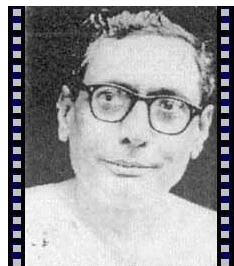The theatrical career of Phani Sarma started as a gatekeeper of the women’s gallery of the prestigious Ban Stage situated at Tezpur. His father Molan Sarma was also an exponent of drama and was a good actor of Ban Stage. So along with his father, Phani Sarma regularly went to the Ban Stage and closely observed the perfect acting of a number of veteran actors like Indreswar Borthakur, Dr Lalit Mohan Chowdhury, Prafulla Borua etc. This inspired young Bolin (as Phani Sarma was popularly known) towards acting and had a deep impact on his future life. In 1928, he got the opportunity to act on the Ban Stage for the first time in the role of Akbar in the drama Rana Pratap. That was the beginning of a new chapter in the life of Phani Sarma.
 In 1930, Phani Sarma joined the Kohinoor Opera, the first mobile theatre group of Assam, started by Natyacharya Brajanath Sarma. From Dhubri to Sadiya, from the north bank to the south bank of the Brahmaputra, Kohinoor Opera performed its dramas, attracting thousands of people. It’s main attraction was the superb acting of Phani Sarma. Apart from initiating a theatrical movement, Kohinoor Opera deserves the credit of introducing co-acting on the stages of Assam. In 1931, Brajanath Sarma, with the help of Phani Sarma introduced female actresses for the female roles of a drama. Prior to this, the female roles were played by male actors. This definitely brought about a new trend to the stages of Assam.
In 1930, Phani Sarma joined the Kohinoor Opera, the first mobile theatre group of Assam, started by Natyacharya Brajanath Sarma. From Dhubri to Sadiya, from the north bank to the south bank of the Brahmaputra, Kohinoor Opera performed its dramas, attracting thousands of people. It’s main attraction was the superb acting of Phani Sarma. Apart from initiating a theatrical movement, Kohinoor Opera deserves the credit of introducing co-acting on the stages of Assam. In 1931, Brajanath Sarma, with the help of Phani Sarma introduced female actresses for the female roles of a drama. Prior to this, the female roles were played by male actors. This definitely brought about a new trend to the stages of Assam.
Phani Sarma played a significant role in the first Assamese feature film Joymoti made by Rupkonwar Jyotiprasad Agarwalla in 1933, where he played the role of Gathi Hazarika, the villain of the film. The brilliant acting of Phani Sarma in that role was a special feature of the film. Later he became popular as Gathi Hazarika. In Jyotiprasad’s second film Indramalati also, Sarma played an important role.
An innate actor, Phani Sarma was a blazing star in the theatrical world of Assam. With his tall figure which was perfect for the stage and his sonorous voice, he captivated entire Assam by acting in more than a hundred dramas in different characters. People who once had the opportunity of seeing the acting of Phani Sarma either on stage or on screen could never forget it. He was most appropriately and accurately called Natasurya (the Sun of drama) by the people of Assam.
With his extraordinary performances on the stage and screen, Phani Sarma earned many laurels and fame all over the State. But he was more brilliant as a playwright than as an actor. Though few in quantity, his dramas are very rich in quality. As an actor, he understood the limitations of a drama and therefore he laid more emphasis upon its dramatical side rather than the literary side. With a universal appeal and substance, all his dramas became very popular on the stage and were widely acclaimed by the critics.
On the basis of a rebellion that took place during the Ahom King Lakshmi Singha’s reign, as described by renowned historian Dr SK Bhuyan in his book Konwar Bidroh, Phani Sarma wrote a historical drama Bhogjara. It is worth mentioning here that the dramatical movement which started during the early part of the last century, set a new trend of staging dramas written by local dramatists, on a local plot. Jyotiprasad Agarwalla was the pioneer among such dramatists. With local plots, he wrote a number of dramas like Sonit Kunwari, Karengar Ligiri, Lobhita, etc. Following Jyotiprasad’s footsteps, Phani Sarma wrote a number of dramas with a plot quite familiar to the Assamese people. He drew only the skeleton of the drama Bhogjara from the above mentioned book. But with his own dramatical approach and treatment, Bhogjara became successful as a powerful drama.
In 1948 Sarma, along with Bishnu Rava made a feature film Siraj, based on a popular short story written by Deshapran Lakshmidhar Sarma. The success of the film later inspired him to write a drama titled Siraj. It was regarded as a document of Hindu-Muslim integrity as the memory of Partition was still fresh in the minds of the people. Phani Sarma himself played the title role of the drama on more than a hundred stages, mesmerizing people all over Assam. In our degenerated society, the story of Siraj is still relevant.
On the basis of his own experiences as an actor, Phani Sarma wrote a social drama Kiya. The Natasurya was an artiste who dedicated his own personal life and enjoyment only to entertain other people. But in return he got nothing from the society. This was the personal experience of Phani Sarma who got the sad news of his son’s death when he was acting on a stage in upper Assam. This bitter experience led him to write the drama Kiya. A socially responsible artiste, Phani Sarma became vociferous against corruption in his drama Nag-Pas. Similarly he protested against the social injustice and dominance of outsiders in our society in a humorous way in his drama Kola-Bazar. By translating JB Priestley’s famous drama An Inspector Calls into Assamese, he also enriched our dramatical literature.
